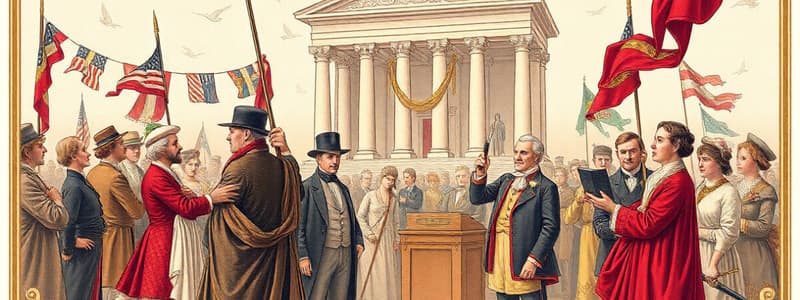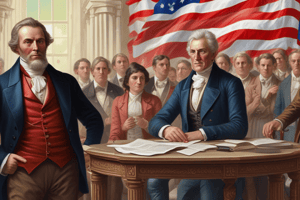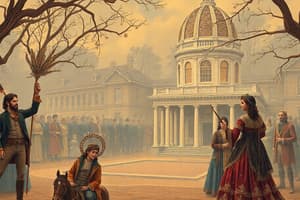Podcast
Questions and Answers
What was a major theme of Jackson's campaign for the election of 1828?
What was a major theme of Jackson's campaign for the election of 1828?
- Appealing to the common man (correct)
- Focus on foreign relations
- Centralized power
- Preservation of existing political structures
How did the election of 1828 mark a shift in American politics?
How did the election of 1828 mark a shift in American politics?
- It restricted voting rights based on property ownership.
- It resulted in the abolition of slavery.
- It began the democratization of politics. (correct)
- It led to the establishment of the two-party system.
What impact did new western states have on the political landscape during Jackson's era?
What impact did new western states have on the political landscape during Jackson's era?
- They reinforced property qualifications.
- They led to a decrease in political participation.
- They made voting more accessible by eliminating property requirements. (correct)
- They encouraged the rise of the Democratic Party.
Which phrase is associated with Daniel Webster during the Webster-Hayne debate?
Which phrase is associated with Daniel Webster during the Webster-Hayne debate?
What was Jackson's stance on federal revenues from tariffs?
What was Jackson's stance on federal revenues from tariffs?
Why did Jackson veto the Maysville Road project?
Why did Jackson veto the Maysville Road project?
What characterized the political environment during the Jacksonian era?
What characterized the political environment during the Jacksonian era?
What was one of the consequences of the rise of the common man during the Jacksonian era?
What was one of the consequences of the rise of the common man during the Jacksonian era?
What action did Georgia take regarding Cherokee laws and land?
What action did Georgia take regarding Cherokee laws and land?
Which statement best represents Andrew Jackson's view on the nullification crisis?
Which statement best represents Andrew Jackson's view on the nullification crisis?
What was the Specie Circular issued by Jackson intended to address?
What was the Specie Circular issued by Jackson intended to address?
What was a significant result of Andrew Jackson's Bank War?
What was a significant result of Andrew Jackson's Bank War?
How did John Calhoun's views on federalism differ from Andrew Jackson's?
How did John Calhoun's views on federalism differ from Andrew Jackson's?
What was the consequence of the Trail of Tears?
What was the consequence of the Trail of Tears?
What was the primary purpose of the force bill passed by Congress during the nullification crisis?
What was the primary purpose of the force bill passed by Congress during the nullification crisis?
Which statement describes the outcomes of Jackson's policies?
Which statement describes the outcomes of Jackson's policies?
What was the primary goal of Jackson's spoils system?
What was the primary goal of Jackson's spoils system?
What advantage did the Whig Party have during the election of 1840?
What advantage did the Whig Party have during the election of 1840?
What approach did Martin Van Buren take towards federal banking during his presidency?
What approach did Martin Van Buren take towards federal banking during his presidency?
Which describes Andrew Jackson's foreign affairs management?
Which describes Andrew Jackson's foreign affairs management?
Which statement characterizes the political influence of Nicholas Biddle during Jackson's presidency?
Which statement characterizes the political influence of Nicholas Biddle during Jackson's presidency?
What was a defining trait of Jackson's presidency, according to critiques?
What was a defining trait of Jackson's presidency, according to critiques?
Flashcards
Jacksonian Era
Jacksonian Era
A period in US history marked by the rise of Andrew Jackson as president, emphasizing the common man and democratizing politics.
Election of 1828
Election of 1828
Andrew Jackson's election, signifying a change in political campaigning and focus on the common man.
Common Man
Common Man
The idea that ordinary people are important and deserve a voice in government.
Democratizing Politics
Democratizing Politics
Signup and view all the flashcards
Webster-Hayne debate
Webster-Hayne debate
Signup and view all the flashcards
Maysville Road
Maysville Road
Signup and view all the flashcards
Property Qualifications
Property Qualifications
Signup and view all the flashcards
Increased Voting Rights
Increased Voting Rights
Signup and view all the flashcards
Trail of Tears
Trail of Tears
Signup and view all the flashcards
Nullification Crisis
Nullification Crisis
Signup and view all the flashcards
Bank War
Bank War
Signup and view all the flashcards
Pet Banks
Pet Banks
Signup and view all the flashcards
Specie Circular
Specie Circular
Signup and view all the flashcards
Panic of 1837
Panic of 1837
Signup and view all the flashcards
Jacksonian Democracy
Jacksonian Democracy
Signup and view all the flashcards
Kitchen Cabinet
Kitchen Cabinet
Signup and view all the flashcards
Spoils System
Spoils System
Signup and view all the flashcards
Log Cabin Campaign
Log Cabin Campaign
Signup and view all the flashcards
Cherokee Nation
Cherokee Nation
Signup and view all the flashcards
John Marshall
John Marshall
Signup and view all the flashcards
Andrew Jackson
Andrew Jackson
Signup and view all the flashcards
Martin Van Buren
Martin Van Buren
Signup and view all the flashcards
Whigs
Whigs
Signup and view all the flashcards
Study Notes
Election of 1828: National Republicans v. Democrats
- Jackson, angered by losing the 1824 election, immediately campaigned for 1828.
- His campaign focused on connecting with the "common man."
- He opposed centralized power and championed the views of the people.
- His relatable personality and direct campaigning style (speeches, rallies) won him widespread support.
- Jackson's victory marked the beginning of the Jacksonian era and a shift towards more democratic politics.
Democratizing Politics
- Jackson believed the people's inherent sense of right made them capable of governing effectively.
- Western states removed property qualifications for voting and holding office, reflecting the rise of the common man.
- Most states (except Delaware and South Carolina) moved to electing officials by popular vote.
- The era saw the rise of public education with a focus on free schools.
- Increased voting rights and public participation led to candidates emphasizing public appeal in campaigns, marketing, and organized party structures – reflecting modern political strategies.
Sectional Tensions Revived / Webster-Hayne Debate
- The debate stemmed from Senator Foote's resolution proposing raising land prices.
- Webster famously declared "Liberty and UNION, now and forever, one and inseparable!"
- Jackson favored reduced tariffs and suggested distributing surplus federal revenue to the states.
- However, western states wanted lower land prices and clashed with southern interests.
- Webster's stance blocked regional alliances on land and tariff.
Maysville Road
- Jackson vetoed the Maysville Road project because the road was entirely within Kentucky, preferring local projects to be a state responsibility.
Worcester v. Georgia
- Georgia declared Cherokee laws void, claiming Cherokee land as Georgia's.
- The Supreme Court (John Marshall) ruled against Georgia's claim, affirming Cherokee autonomy.
- Jackson ignored the Supreme Court ruling, asserting that no nation could exist within US borders.
Cherokee Nation
- The Cherokee tribe tried to assimilate, adopting white ways to protect their land.
- The US disregarded many previous treaties with Native American tribes.
Trail of Tears
- Thousands of Native Americans were forcibly removed from their ancestral lands by Jackson.
- The removal was devastating and had significant international consequences.
Nullification Crisis
- Calhoun argued that states could nullify federal laws they deemed unconstitutional.
- Jackson viewed nullification as treason, threatening military force.
- A tariff reduction and the "Force Bill" (authorizing the president to enforce federal laws) resolved the crisis, and South Carolina repealed its nullification ordinance.
Bank War
- Jackson promised to destroy the National Bank.
- He vetoed the bank's recharter bill.
- Jackson withdrew government funds from the bank.
- Nicholas Biddle, the bank president, fought back, leading to a financial crisis.
Boom and Bust
- Increased currency led to rising land prices and a government surplus.
- But the specie circular (requiring land payments in gold or silver) caused a financial panic.
- State banks (pet banks) often held federal funds and lacked stability, contributing to instability.
Jacksonian Policies
- Jackson, the "man of the people," vetoed many bills and often acted without consulting others.
- His policies impacted foreign affairs, despite some diplomatic successes (trade agreements).
Kitchen Cabinet
- Jackson relied on an informal group of advisors (Kitchen Cabinet) rather than official cabinet members.
- This highlighted Jackson’s personal loyalty over established procedures.
Spoils System
- Jackson's policy rotated federal positions among citizens.
- This meant that those loyal to him were rewarded with government jobs.
John Calhoun
- A significant Southern figure, Calhoun strongly opposed Jackson and disagreed on states' rights.
Roger Taney
- Chief Justice during the Dred Scott case, he ruled that enslaved people were not citizens and unable to sue.
Whigs
- Led by Henry Clay, the Whigs were a less unified opposition against Jackson's policies.
Martin Van Buren
- Jackson's successor, Van Buren faced the Panic of 1837 upon taking office.
- He proposed economic measures (Treasury Independent Act) but had limited success due to circumstances.
Panic of 1837
- Jackson's policies, particularly the Specie Circular, played a role in triggering the Panic of 1837.
- The crisis lasted until about 1843 with falling cotton prices and state government defaults.
Election of 1840
- The Panic of 1837 hurt the Democrats.
- The Whigs organized and used marketing ("Log Cabin Campaign") strategies to win.
- William Henry Harrison's victory marked the end of Van Buren's presidency.
William Henry Harrison and John Tyler
- Harrison, a Whig president, died soon after taking office, and John Tyler became president.
Studying That Suits You
Use AI to generate personalized quizzes and flashcards to suit your learning preferences.




